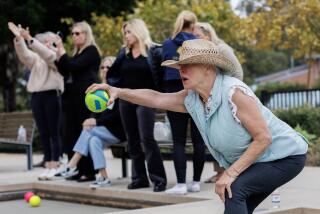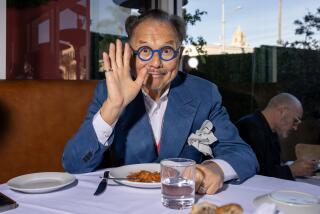Giving Badminton a Fair Shot
- Share via
References to tennis clearly pain members of the Chew family.
If Americans would just give equal status to badminton, they insist, this nation could easily conquer all contenders in world competition.
The Chews, emigres to Southern California from Thailand by way of Canada in 1972, say they are just months away from helping to make that vision a reality.
Work will begin next month on their Orange County Badminton Club, a 73,000-square-foot facility on Main Street, with July as the target opening date. The club will not only be the largest badminton training facility in the United States, it will be the only one, the Chews say.
“I love this country, and I want this country to be No. 1 in the sport,” said Don Chew, who at 54 won the men’s national senior title in Pomona last year. “We should at least be in the top 10. . . . This is a passion inside me.”
That passion is apparent several nights a week, when the family and some of their 31 employees push aside machinery at their printing company, K&D; Graphics, to play badminton in hotly contested matches in which they smash the shuttlecock over the net.
Don Chew and wife Kim have both played the game since childhood. They had hoped to train their children, Montri, Bebe and Gus, to be international competitors, but the demands of building their business cut into their badminton time.
Bebe Chew, now 29, played the sport in high school, however, and recalls her frustrations.
“We see a lot of talent go to waste because there is no place to train after high school,” she said, arguing that badminton requires greater skill than tennis.
“You have to have great endurance and agility,” she said. “People think it’s easy because the racquet is light,” about 3 ounces.
“But there are a lot of trick shots in badminton. There is a lot of strategy involved.”
Play is strenuous too, requiring lightning speed to hit a shuttlecock that can reach a speed of 200 mph in world-class competition, she said.
The $3-million, 18-court badminton complex, so large that it will also house the family’s printing plant, could eventually be the headquarters for training U.S. athletes for international competition, Don Chew said.
He is already in discussions with the U.S. Badminton Assn. about training athletes for the 2004 Olympics, he said, and hopes to recruit top coaches and players.
More to Read
Go beyond the scoreboard
Get the latest on L.A.'s teams in the daily Sports Report newsletter.
You may occasionally receive promotional content from the Los Angeles Times.










